2012年高三英语精编复习资料:语法专题(虚拟语气)
(完整版)英语虚拟语气语法归纳总结
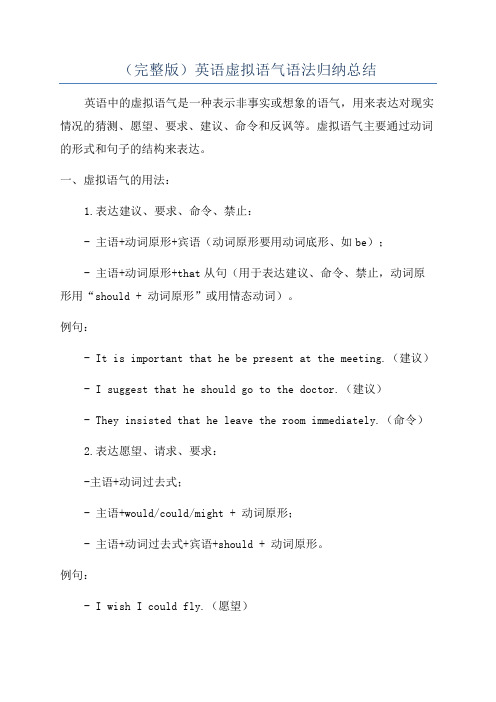
(完整版)英语虚拟语气语法归纳总结英语中的虚拟语气是一种表示非事实或想象的语气,用来表达对现实情况的猜测、愿望、要求、建议、命令和反讽等。
虚拟语气主要通过动词的形式和句子的结构来表达。
一、虚拟语气的用法:1.表达建议、要求、命令、禁止:- 主语+动词原形+宾语(动词原形要用动词底形、如be);- 主语+动词原形+that从句(用于表达建议、命令、禁止,动词原形用“should + 动词原形”或用情态动词)。
例句:- It is important that he be present at the meeting.(建议)- I suggest that he should go to the doctor.(建议)- They insisted that he leave the room immediately.(命令)2.表达愿望、请求、要求:-主语+动词过去式;- 主语+would/could/might + 动词原形;- 主语+动词过去式+宾语+should + 动词原形。
例句:- I wish I could fly.(愿望)- I would appreciate it if you could help me.(请求)3.表示虚拟条件:- If条件从句中的谓语动词用过去完成时,主句用would/should/might/could + have + 过去分词;- If条件从句中的谓语动词用过去时,主句用would/should/could + 动词原形。
例句:- If I had known his phone number, I would have called him.(虚拟条件)- If you had listened to me, we could have finished the project earlier.(虚拟条件)4.表达建议、要求、祝愿:- If only内部称述 + 主语 + 过去式。
英语语法复习之情态动词和虚拟语气
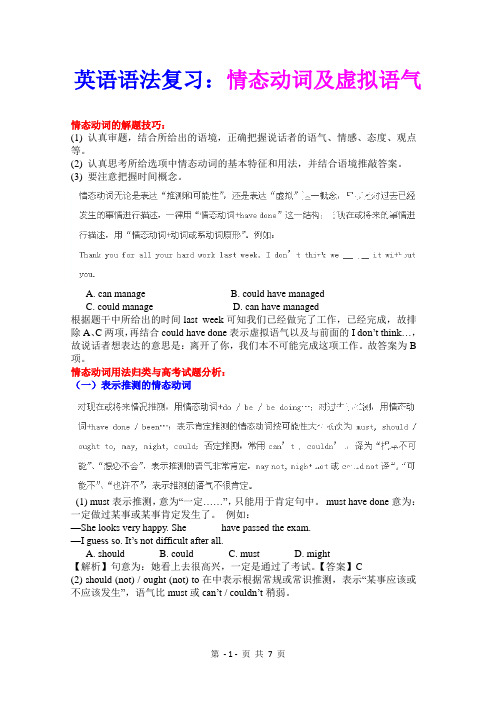
英语语法复习:情态动词及虚拟语气情态动词的解题技巧:(1) 认真审题,结合所给出的语境,正确把握说话者的语气、情感、态度、观点等。
(2) 认真思考所给选项中情态动词的基本特征和用法,并结合语境推敲答案。
(3) 要注意把握时间概念。
A. can manageB. could have managedC. could manageD. can have managed根据题干中所给出的时间last week可知我们已经做完了工作,已经完成,故排除A、C两项,再结合could have done表示虚拟语气以及与前面的I don’t think…,故说话者想表达的意思是:离开了你,我们本不可能完成这项工作。
故答案为B 项。
情态动词用法归类与高考试题分析:(一)表示推测的情态动词(1) must表示推测,意为―一定……‖,只能用于肯定句中。
must have done意为:一定做过某事或某事肯定发生了。
例如:—She looks very happy. She ______ have passed the exam.—I guess so. It’s not difficult after all.A. shouldB. couldC. mustD. might【解析】句意为:她看上去很高兴,一定是通过了考试。
【答案】C(2) should (not) / ought (not) to在中表示根据常规或常识推测,表示―某事应该或不应该发生‖,语气比must或can’t / couldn’t稍弱。
(3) can, could表达推测时,一般用于疑问句和否定句中;can用于肯定句中表示一种理论上的可能性,并不牵涉是否真的会发生,在这种用法中can只能与动词原形连用;could用于肯定句中,语气比may/ might更弱。
①You ______ be hungry already — you had lunch only two hours ago!A. wouldn’tB. can’tC. mustn’tD. needn’t②She ______ have left school, for her bike is still here.A. can’tB. wouldn’tC. shouldn’tD. needn’t③It is usually warm in my hometown in March, but it ____ be rather cold sometime.A. mustB. canC. shouldD. would④Peter ____ be really difficult at times even though he’s a nice person in general.A. shallB. shouldC. canD. must(4)may (not) / might (not)表达一种不太把握的推测,意为―或许,可能‖;might 的语气比may较婉转。
2012届高三英语一轮复习语法精讲:专题11 情态动词和虚拟语气(北师大版)
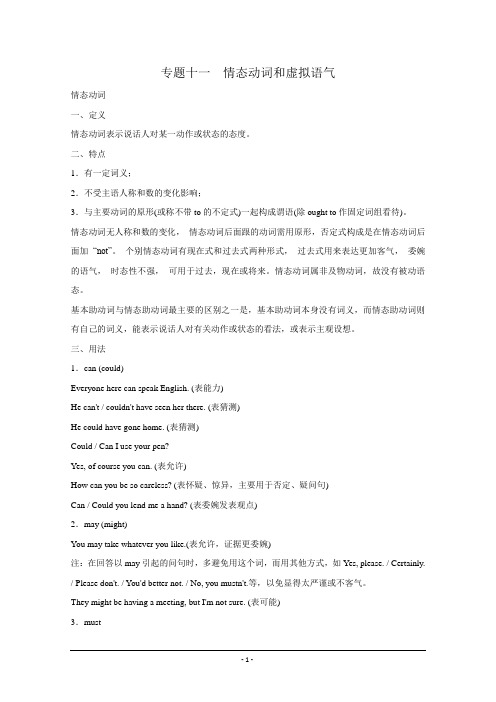
专题十一情态动词和虚拟语气情态动词一、定义情态动词表示说话人对某一动作或状态的态度。
二、特点1.有一定词义;2.不受主语人称和数的变化影响;3.与主要动词的原形(或称不带to的不定式)一起构成谓语(除ought to作固定词组看待)。
情态动词无人称和数的变化,情态动词后面跟的动词需用原形,否定式构成是在情态动词后面加“not”。
个别情态动词有现在式和过去式两种形式,过去式用来表达更加客气,委婉的语气,时态性不强,可用于过去,现在或将来。
情态动词属非及物动词,故没有被动语态。
基本助动词与情态助动词最主要的区别之一是,基本助动词本身没有词义,而情态助动词则有自己的词义,能表示说话人对有关动作或状态的看法,或表示主观设想。
三、用法1.can (could)Everyone here can speak English. (表能力)He can't / couldn't have seen her there. (表猜测)He could have gone home. (表猜测)Could / Can I use your pen?Yes, of course you can. (表允许)How can you be so careless? (表怀疑、惊异,主要用于否定、疑问句)Can / Could you lend me a hand? (表委婉发表观点)2.may (might)You may take whatever you like.(表允许,证据更委婉)注:在回答以may引起的问句时,多避免用这个词,而用其他方式,如Yes, please. / Certainly. / Please don't. / You'd better not. / No, you mustn't.等,以免显得太严谨或不客气。
They might be having a meeting, but I'm not sure. (表可能)3.mustYou must buy a ticket. (表义务,意为“必须”)注:回答Must...? 引出的问句时,肯定回答用must; 否定回答不能用mustn't, 而要用needn't 或don't have to。
高中英语语法复习:虚拟语气知识点讲解及巩固练习题(含答案)
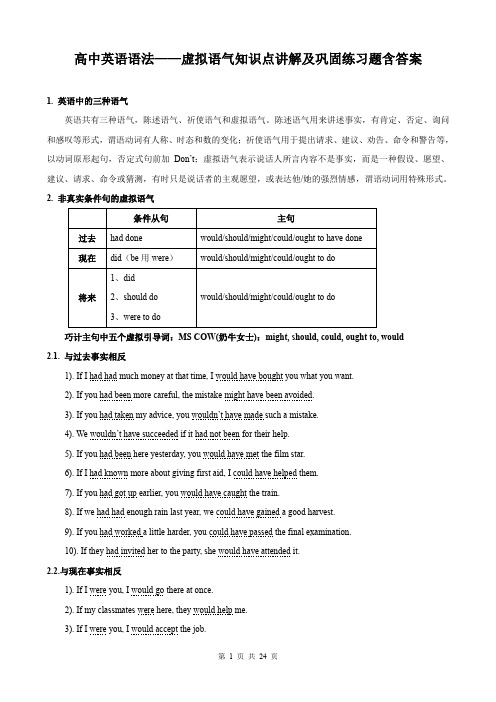
高中英语语法——虚拟语气知识点讲解及巩固练习题含答案1. 英语中的三种语气英语共有三种语气,陈述语气、祈使语气和虚拟语气。
陈述语气用来讲述事实,有肯定、否定、询问和感叹等形式,谓语动词有人称、时态和数的变化;祈使语气用于提出请求、建议、劝告、命令和警告等,以动词原形起句,否定式句前加Don’t;虚拟语气表示说话人所言内容不是事实,而是一种假设、愿望、建议、请求、命令或猜测,有时只是说话者的主观愿望,或表达他/她的强烈情感,谓语动词用特殊形式。
2. 非真实条件句的虚拟语气条件从句主句过去had done would/should/might/could/ought to have done现在did(be用were)would/should/might/could/ought to do将来1、did2、should do3、were to dowould/should/might/could/ought to do巧计主句中五个虚拟引导词:MS COW(奶牛女士):might, should, could, ought to, would 2.1. 与过去事实相反1). If I had had much money at that time, I would have bought you what you want.2). If you had been more careful, the mistake might have been avoided.3). If you had taken my advice, you wouldn’t have made such a mistake.4). We wouldn’t have succ eeded if it had not been for their help.5). If you had been here yesterday, you would have met the film star.6). If I had known more about giving first aid, I could have helped them.7). If you had got up earlier, you would have caught the train.8). If we had had enough rain last year, we could have gained a good harvest.9). If you had worked a little harder, you could have passed the final examination.10). If they had invited her to the party, she would have attended it.2.2.与现在事实相反1). If I were you, I would go there at once.2). If my classmates were here, they would help me.3). If I were you, I would accept the job.4). If classes were smaller, children would learn more.5). If I were ten years younger, I would start all over again.6). If I had enough money, I would buy a large house.7). If I had time, I would go shopping with you.8). If I knew all the answers to all your questions, I would be a genius.9). If he were here now, we would ask him about it.10). If I had time, I would study French.11). If I knew her number, I could ring her. (可惜我不知道)12). If there were no gravity, we should not be able to walk. (实际上地球引力始终存在。
高考英语语法专题复习-动词的语气-虚拟语气

语法复习十:动词的语气——虚拟语气一、语气的定义和种类l、语气:语气是动词的一种形式,它表示说话人对某一行为或事情的看法和态度。
2、语气的种类:(1)陈述语气: 表示动作或状态是现实的、确定的或符合事实的,用于陈述句、疑问句和某些感叹句。
如:We are not ready. 我们没准备好。
What a fine day it is!多好的天气啊!(2)祈使语气: 表示说话人的建议、请求、邀请、命令等。
如: Open the door, please。
请打开门。
(3)虚拟语气: 表示动作或状态不是客观存在的事实,而是说话人的主观愿望、假设或推测等。
如: If I were you, I should study English. 如果我是你,我就学英语了。
May you succeed! 祝您成功!二、虚拟语气在条件从句中的用法条件句有两类,一类是真实条件句,一类是虚拟条件句。
如果假设的情况是有可能发生的,就是真实条件何。
在这种真实条件句中的谓语用陈述语气。
如: If it doesn’t rain tomorrow, we will go to the park. 如果明天不下雨,我们就去公园。
如果假设的情况是过去或现在都不存在的,或将来不大可能发生的,则是虚拟条件句。
如: If he had seen you yesterday, he would have asked you about it. 如果他昨天见到你,他会问你这件事的。
(事实上他昨天没见到你,因此也未能问你这件事。
)在含有虚拟条件句的复合句中,主句和从句的谓语都要用虚拟语气。
现将虚拟条件从should 可用于各种人称。
l、表示与现在事实相反的假设和结果。
如: If my brother were here, everything would be all right. 要是我哥哥在这儿,一切都没问题了。
2、表示与过去事实相反的假设和结果。
高中英语高考语法知识整理复习(虚拟语气+倒装句)

高考英语虚拟语气一、虚拟条件句中的虚拟语气1、表示与现在事实相反的情况从句:If+主语+did (be动词用were)主句:主语+ should/would/might/ could + doIf I were you, I would take an umbrella.如果我是你,我会带把伞。
(事实:我不可能是你)If I knew his telephone number, I would tell you.如果我知道他的电话号码,我就会告诉你。
(事实:不知道)If there were no air or water, there would be no living things on the earth.如果没有水和空气,地球上就不会有生物。
(事实:地球上既有空气也有水)2、表示与过去事实相反的情况从句:If+主语+ had + done主句:主语+should/would/might/could+have doneIf I had got there earlier, I should/would have met her.如果我早到那儿,我就会见到她(事实:去晚了)。
If he had taken my advice, he would not have made such a mistake.如果他听我的劝告的话,就不会犯这样的错误了。
(事实:没有听我的话)3、表示与将来事实相反的情况从句:①if+主语+were to do②if+主语+should+do③if+主语+过去式(be动词用were)主句:主语+should/would/might/could+doIf he should come here tomorrow, I would talk to him.如果他明天来这儿的话,我就跟他谈谈。
(事实:不可能来)If there were a heavy snow next Sunday, we would go skating.如果下周日下大雪,我们就去滑冰。
2012届高考英语语法精品学案:专题8 情态动词和虚拟语气
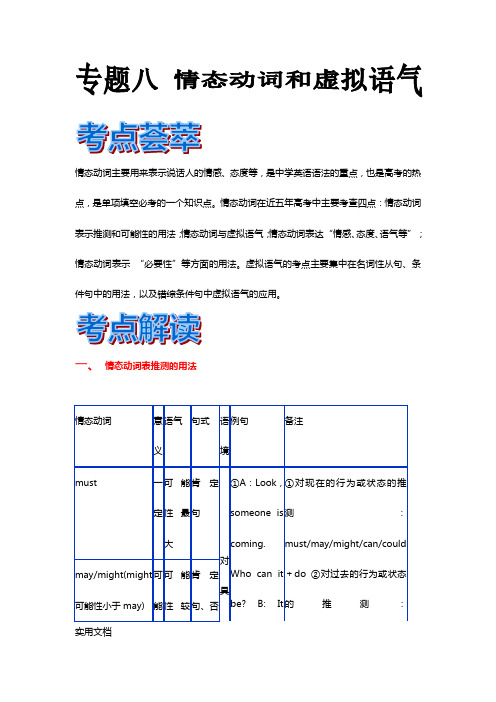
情态动词主要用来表示说话人的情感、态度等,是中学英语语法的重点,也是高考的热点,是单项填空必考的一个知识点。
情态动词在近五年高考中主要考查四点:情态动词表示推测和可能性的用法;情态动词与虚拟语气;情态动词表达“情感、态度、语气等”;情态动词表示“必要性”等方面的用法。
虚拟语气的考点主要集中在名词性从句、条件句中的用法,以及错综条件句中虚拟语气的应用。
一、情态动词表推测的用法实用文档体事实的判断may be ourheadmaster.A: It can’tbe him. Hehas gone toShanghai. B:It must beMr. Wang.He lookslike ourheadmaster.②That maynot be true.③Hecouldn'thavediscoveredthe truth.must/may/might/can/couldhave done实用文档注意:should (ought to)表示推测是高考考查的重点和难点。
如:—When can I come for the photos?I need them tomorrow afternoon.—They ________ be ready by 12:00.A.can B.should C.might D.need【解析】B A项表示推测时常用于否定句和疑问句中。
C项表示推测语气不太肯定。
should意为“按理说,理应”,既回答了顾客的询问,不失礼貌,又为照片有可能尚未洗好,顾客到时取不到留下了回旋的余地,体现了店主的精明与用词经过仔细推敲。
实用文档二、情态动词的其他用法1.can, could, may, might实用文档。
2.must, should实用文档实用文档3. need, dare实用文档4.shall/will/would实用文档4.shall/will/would4.shall/will/would 实用文档二、情态动词+have done实用文档实用文档四、虚拟语气虚拟语气表示说话人所说的话不是事实,而是一种假设、愿望、怀疑或推测。
高考英语语法难点:虚拟语气(每年都考)
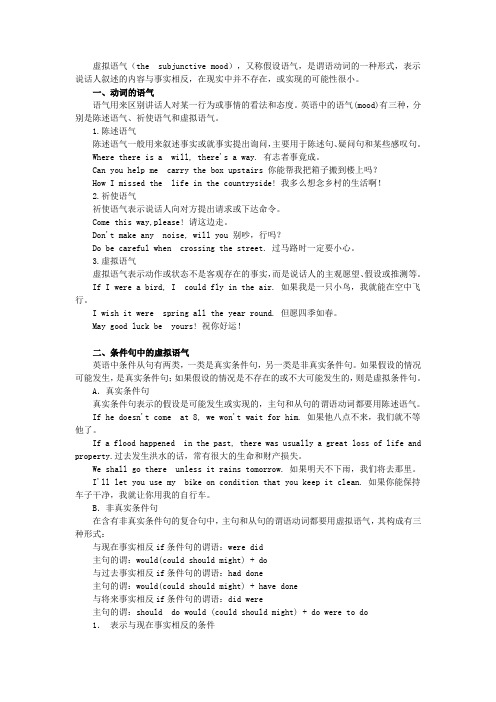
虚拟语气(the subjunctive mood),又称假设语气,是谓语动词的一种形式,表示说话人叙述的内容与事实相反,在现实中并不存在,或实现的可能性很小。
一、动词的语气语气用来区别讲话人对某一行为或事情的看法和态度。
英语中的语气(mood)有三种,分别是陈述语气、祈使语气和虚拟语气。
1.陈述语气陈述语气一般用来叙述事实或就事实提出询问,主要用于陈述句、疑问句和某些感叹句。
Where there is a will, there's a way. 有志者事竟成。
Can you help me carry the box upstairs 你能帮我把箱子搬到楼上吗?How I missed the life in the countryside! 我多么想念乡村的生活啊!2.祈使语气祈使语气表示说话人向对方提出请求或下达命令。
Come this way,please! 请这边走。
Don't make any noise, will you 别吵,行吗?Do be careful when crossing the street. 过马路时一定要小心。
3.虚拟语气虚拟语气表示动作或状态不是客观存在的事实,而是说话人的主观愿望、假设或推测等。
If I were a bird, I could fly in the air. 如果我是一只小鸟,我就能在空中飞行。
I wish it were spring all the year round. 但愿四季如春。
May good luck be yours! 祝你好运!二、条件句中的虚拟语气英语中条件从句有两类,一类是真实条件句,另一类是非真实条件句。
如果假设的情况可能发生,是真实条件句;如果假设的情况是不存在的或不大可能发生的,则是虚拟条件句。
A.真实条件句真实条件句表示的假设是可能发生或实现的,主句和从句的谓语动词都要用陈述语气。
If he doesn't come at 8, we won't wait for him. 如果他八点不来,我们就不等他了。
2012高考英语复习虚拟语气讲解及习题
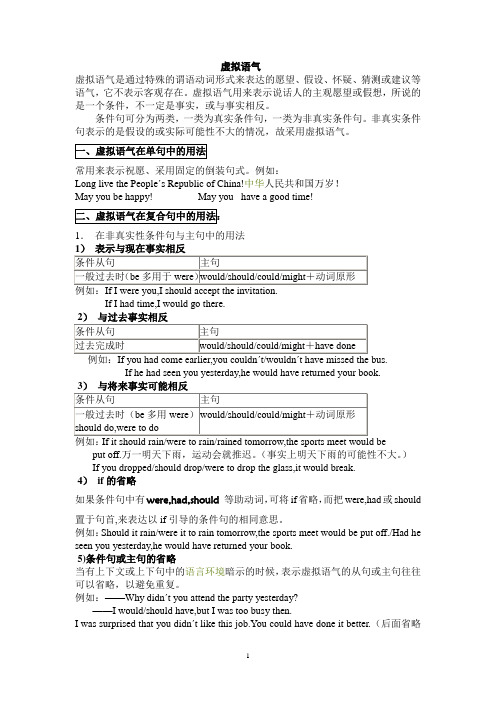
虚拟语气虚拟语气是通过特殊的谓语动词形式来表达的愿望、假设、怀疑、猜测或建议等语气,它不表示客观存在。
虚拟语气用来表示说话人的主观愿望或假想,所说的是一个条件,不一定是事实,或与事实相反。
条件句可分为两类,一类为真实条件句,一类为非真实条件句。
非真实条件句表示的是假设的或实际可能性不大的情况,故采用虚拟语气。
常用来表示祝愿、采用固定的倒装句式。
例如:Long live the People´s Republic of China!中华人民共和国万岁!May you be happy! May you have a good time!1.在非真实性条件句与主句中的用法If I had time,I would go there.If he had seen you yesterday,he would have returned your book.put off.万一明天下雨,运动会就推迟。
(事实上明天下雨的可能性不大。
)If you dropped/should drop/were to drop the glass,it would break.4)if的省略如果条件句中有were,had,should 等助动词,可将if省略,而把were,had或should置于句首,来表达以if引导的条件句的相同意思。
例如:Should it rain/were it to rain tomorrow,the sports meet would be put off./Had he seen you yesterday,he would have returned your book.5)条件句或主句的省略当有上下文或上下句中的语言环境暗示的时候,表示虚拟语气的从句或主句往往可以省略,以避免重复。
例如:——Why didn´t you attend the party yesterday?——I would/should have,but I was too busy then.I was surprised that you didn´t like this job.You could have done it better.(后面省略了if you had liked it.)6)混合时间条件句与主句条件句与主句的动作发生的时间有先后之差,应按各自动作时间搭配好相应的结构形式。
英语语法专项:虚拟语气用法详解及练习(附答案)

高中英语虚拟语气讲解及练习虚拟条件句就是对现实条件的一种虚拟假设,所假设的条件一般不符合事实或与事实相反或在现实中发生的可能性极小。
根据时间的不同,虚拟条件句可分为三种,即与现在事实相反的虚拟条件句、与过去事实相反的虚拟条件句(1)表示与现在事实相反If I had enough money now, I would lend it to you.(2)表示与过去事实相反If he had taken your advice, he wouldn’t have made such a bad mistake.(3)表示与将来事实相反I would go shopping with you if it were to be Sunday tomorrow.1. 虚拟条件句的倒装在虚拟条件句中,为了强调所假设条件的虚拟性,或突出说话人的一种主观愿望,虚拟条件句可用倒装结构。
虚拟条件句的倒装是通过去掉if,把条件从句谓语中的助动词、情态动词或系动词放在句首实现的。
例如:Had I been(= If I had been ) in that situation, I would not have let the thief escape away with so much money.Should there be (= If there should be) a drought, what should we do at that time ?2. 错综时间条件句有时条件从句的动作和主句的动作发生的时间并不一致,这时谓语动词的形式应根据它所要表示的具体时间来确定。
例如:If we hadn’t been working hard in the past few years ,thing s wouldn’t be going so smoothly.3. 含蓄条件句有时假设的情况并不以条件从句的形式表现出来,而是通过某个介词或介词短语(如:with,otherwise,without,but for,in that position)、上下文或其它方式表现出来。
《高三高考语法复习虚拟语气》

• 1. Thank you for all your hard work last week. I don’t think we ______ it without you.
A. can manage C. could managed B. could have managed D. can have managed
与将来事实相反的虚拟条件句(通常有时间状语)
If + 主语 + did (were to /should do), 主语+ would/should/could/might +动词原形 1.如果他明天来的话,我会告诉他这件事. If he came (come)here tomorrow, I would tell (tell) him about it. = If he were to/should come here tomorrow, I would tell him.
4. I didn’t see your sister at the meeting. If she __________, she would have met my brother. A. has come B. did come C. came D. had come
5. If my lawyer _______here last Sunday, he _______ me from going .
If I had (have)one million dollars, I would buy (buy)
the plane.
与过去事实相反的虚拟条件句
If +主语 + had done sth , 主语+ would/should/could/might + have done 1.如果他努力学的话,他就通过这次考试了。 If he had worked (work)hard, he would have passed (pass) the examination. 2.要是当时我和她结了婚的话,那我是很不幸的。 If I had married (marry) her, I would have been (be) unhappy.
【语法讲解】高中英语--虚拟语气专题讲解(详细)
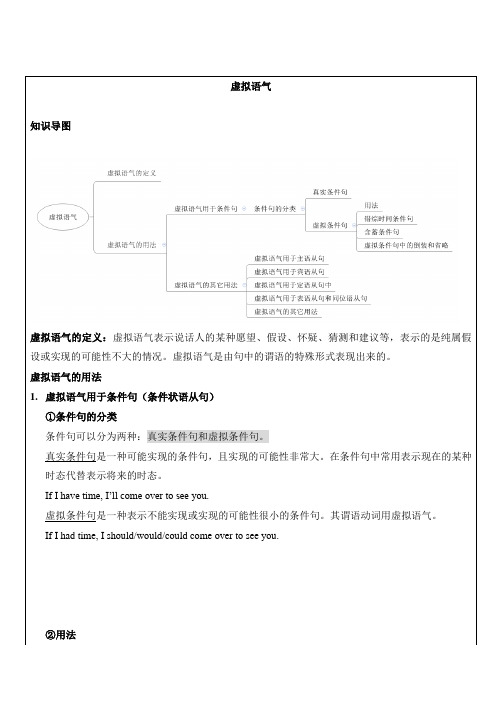
虚拟语气
知识导图
虚拟语气的定义:虚拟语气表示说话人的某种愿望、假设、怀疑、猜测和建议等,表示的是纯属假设或实现的可能性不大的情况。
虚拟语气是由句中的谓语的特殊形式表现出来的。
虚拟语气的用法
1.虚拟语气用于条件句(条件状语从句)
①条件句的分类
条件句可以分为两种:真实条件句和虚拟条件句。
真实条件句是一种可能实现的条件句,且实现的可能性非常大。
在条件句中常用表示现在的某种时态代替表示将来的时态。
If I have time, I’ll come over to see you.
虚拟条件句是一种表示不能实现或实现的可能性很小的条件句。
其谓语动词用虚拟语气。
If I had time, I should/would/could come over to see you.
②用法。
英语语法专项:虚拟语气用法详解及练习(附答案)

英语语法专项:虚拟语⽓⽤法详解及练习(附答案)虚拟语⽓⽤法详解⼀、条件句中的虚拟语⽓1. 条件句中虚拟语⽓的形式从句中提出⼀种与客观现实不相符或根本不可能存在的条件,主句会产⽣的⼀种不可能获得的结果。
条件句中(1) 将来时的条件句中的虚拟语⽓。
如:If he should go to Qing Hua University, he would make full use of his time. 如果他要上清华⼤学的话,他就会充分利⽤他的时间了。
If he were to come here, he would tell us about it. 如果他要来的话,他会通知我们⼀声。
(2) 现在时的条件句中的虚拟语⽓。
如:If he were free, he would help us. 要是他有空的话,它会帮助我们的。
If he studied at this school, he would know you well. 如果他在这所学校学习的话,它会对你很熟悉。
(3)过去时的条件句中的虚拟语⽓。
如:If I had seen the film, I would have told you about it. 我如果看过这场电影,我会把电影内容告诉你了。
If I had got there earlier, I would have met Mr. Li. 如果我早点到那⼉,我就会会到了李先⽣。
3. 运⽤条件句中的虚拟语⽓时,须注意的⼏个问题(1)当从句的主语为第三⼈称单数时,谓语动词若是系动词be时,可⽤was 代替were。
但在倒装虚拟结构及if I were you, as it were 中,只能⽤were。
如:Were I ten years younger, I would study abroad. 要是我还年轻⼗岁的话,我会去国外学习。
If I were you, I would try my best to grasp the chance. 要是我是你的话,我要尽⼒抓住这次机会。
2012高考英语语法精品集:虚拟语气.pdf
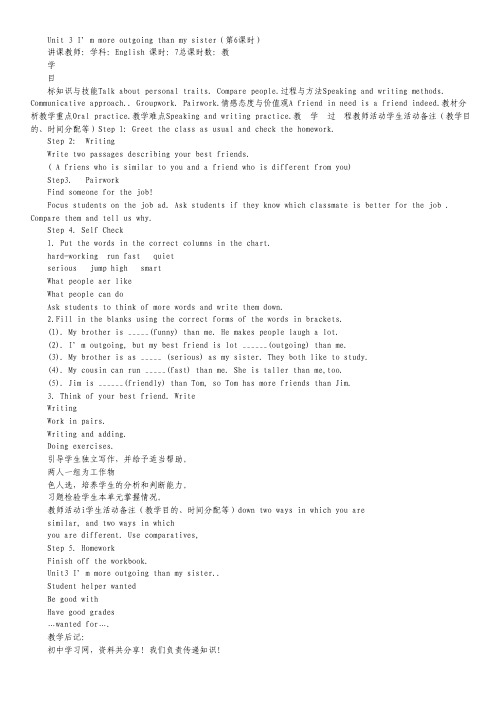
Unit 3 I’m more outgoing than my sister(第6课时) 讲课教师:学科:English 课时:7总课时数:教 学 目 标知识与技能Talk about personal traits. Compare people.过程与方法Speaking and writing methods. Communicative approach.. Groupwork. Pairwork.情感态度与价值观A friend in need is a friend indeed.教材分析教学重点Oral practice.教学难点Speaking and writing practice.教 学 过 程教师活动学生活动备注(教学目的、时间分配等)Step 1: Greet the class as usual and check the homework. Step 2: Writing Write two passages describing your best friends. ( A friens who is similar to you and a friend who is different from you) Step3. Pairwork Find someone for the job! Focus students on the job ad. Ask students if they know which classmate is better for the job . Compare them and tell us why. Step 4. Self Check 1. Put the words in the correct columns in the chart. hard-working run fast quiet serious jump high smart What people aer like What people can do Ask students to think of more words and write them down. 2.Fill in the blanks using the correct forms of the words in brackets. (1). My brother is _____(funny) than me. He makes people laugh a lot. (2). I’m outgoing, but my best friend is lot ______(outgoing) than me. (3). My brother is as _____ (serious) as my sister. They both like to study. (4). My cousin can run _____(fast) than me. She is taller than me,too. (5). Jim is ______(friendly) than Tom, so Tom has more friends than Jim. 3. Think of your best friend. Write Writing Work in pairs. Writing and adding. Doing exercises. 引导学生独立写作,并给予适当帮助。
高考虚拟语气(2012高考)
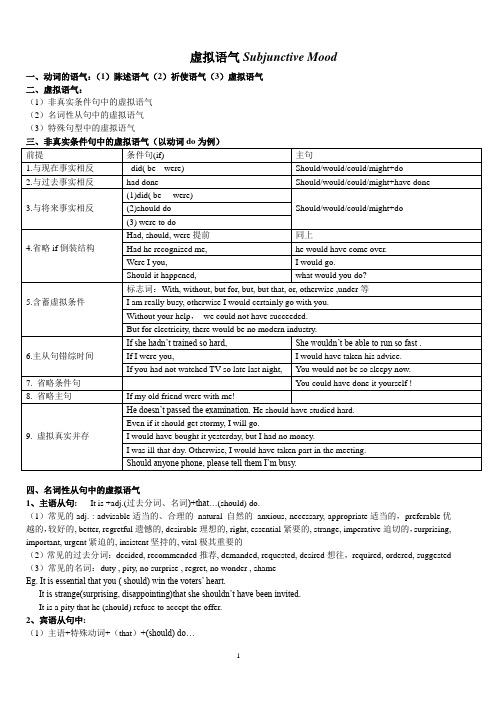
虚拟语气Subjunctive Mood一、动词的语气:(1)陈述语气(2)祈使语气(3)虚拟语气二、虚拟语气:(1)非真实条件句中的虚拟语气(2)名词性从句中的虚拟语气(3)特殊句型中的虚拟语气三、非真实条件句中的虚拟语气(以动词do为例)四、名词性从句中的虚拟语气1、主语从句: It is +adj.(过去分词、名词)+that…(should) do.(1)常见的adj. : advisable适当的、合理的natural 自然的anxious, necessary, appropriate适当的,preferable优越的,较好的, better, regretful遗憾的, desirable理想的, right, essential紧要的, strange, imperative迫切的,surprising, important, urgent紧迫的, insistent坚持的, vital极其重要的(2)常见的过去分词:decided, recommended推荐, demanded, requested, desired想往,required, ordered, suggested (3)常见的名词:duty , pity, no surprise , regret, no wonder , shameEg. It is essential that you ( should) win the voters’ heart.It is strange(surprising, disappointing)that she shouldn’t have been invited.It is a pity that he (should) refuse to accept the offer.2、宾语从句中:(1)主语+特殊动词+(that)+(should) do…常这样用的动词:advise ask order command命令prefer宁愿decide propose demand 要求、需求recommend 推荐desire渴望request determine require insist suggest intend打算urge主张记忆口诀:一个“坚持”(insist),两个“命令(order, command)”, 三个“建议(suggest, advise, propose)”,四个“要求(demand, ask, request, require)”;rid bud去掉倒芽recommend, intend, direct, desire, beg, urge, prefer注意:当suggest, insist表示“暗示”,“坚持说”时,其宾语从句不用虚拟语气He insisted that the meeting be put off.They proposed that all the plans (should) be discussed at the meeting.Are you suggesting that I am not suited for the job?He insisted that he was innocent.(2)在以it 为形式宾语的复合宾语中,也用虚拟语气(should) do,该结构中使用的形容词同上。
- 1、下载文档前请自行甄别文档内容的完整性,平台不提供额外的编辑、内容补充、找答案等附加服务。
- 2、"仅部分预览"的文档,不可在线预览部分如存在完整性等问题,可反馈申请退款(可完整预览的文档不适用该条件!)。
- 3、如文档侵犯您的权益,请联系客服反馈,我们会尽快为您处理(人工客服工作时间:9:00-18:30)。
2012年高三英语精编复习资料:语法专题(虚拟语气)
虚拟语气是历年高考的选考考点。
考点常集中在含蓄条件句以及宾语从句中的虚拟语气上。
所设选项常通过谓语动词的特殊形式来表示, 而且都是结合具体语境来考查对考点的运用能力。
今后高考对虚拟语气的命题重点仍会是在特定语境中考查虚拟语气中的含蓄虚拟条件句、宾语从句中的谓语动词等。
[题1]—Can you come to attend our party tonight?
—Sorry, but I do wish I ____. A. had B. can C. will D. could
【解题关键】解答该题的关键是要理清上下文语境, 准确判断wish引导的宾语从句中虚拟结构的使用。
【答案解析】分析上下文语境可以知道, wish引导的宾语从句表示与将来事实相反的愿望, 故应用would, could+动词原形。
答案D。
[题2] It is necessary that people both young and old in China ____some English to be prepared for the Olympic Games to be held in Beijing in 2008.
A. learn
B. will learn
C. must learn
D. have learned
【解题关键】解答该题的关键是要注意在句型It is necessary(strange, natural, important...)+从句中, 从句中谓语动词虚拟语气结构的使用。
【答案解析】在句型It is necessary(strange, natural, important...)+从句结构中, 从句中谓语动词要用"should+动词原形"构成, should 可以省略。
答案A。
[题3] If he his l
egs in the last training, he the coming World Cup, which he has been longing to compete in.
A. hadn’t hurt; would join in
B. hadn’t hurt; would have taken part in
C. didn’t hurt; would go in for
D. didn’t hurt; would have taken part in
【解题关键】解答该题的关键是根据句子意思准确推断出主从句中谓语动词虚拟结构的使用, 特别注意主从句动作所发生的时间不一致性的关系。
【答案解析】根据句子结构可以知道, 该题是由if引导的条件状语从句, 分析句意, 该句表示一种假设, 从句中的动作是在过去发生, 即表示与过去事实相反, 主句的动作是在将来发生, 即表示与将来事实相反, 故从句谓语动词用had done, 主句用would (could, might)+动词原形。
答案A。
[题4] I was caught in a traffic jam for over an hour, otherwise I ____you waiting for such a long time.
A. will not keep
B. have not kept
C. had not kept
D. would not have kept
【解题关键】解答该题的关键是要把握otherwise表示转折意义后的句子结构中虚拟语气的使用。
【答案解析】根据句子意义, otherwise 前的分句为客观事实, 使用的为一般过去时, 而otherwise 后一分句则表示与过去事实相反的一种假设, 句中实际省略了if 条件句if I hadn’t been caught...故选项部分应为与过去事实相反的主句虚拟结构, 应选wouldn’t have kept。
答案D。
[题5] Though the girl had been suffering from the blood disease, she acted as if nothing ____ to her while facing her friends and relations.
A. happened
B. would happen
C. was happened
D. had happened
【解题关键】解答该题的关键是要准确判断as if引导的从句中虚拟结构的使用。
【答案解析】在as if , as though 引导的方式状语从句中, 从句谓语动词要用虚拟结构, 根据题干中动词所使用的时态可以看出, 选项部分是表示与过去事实相反的动作, 要用had + 过去分词构成。
答案D。
[题6] It’s high time that we students _____ even harder at our lessons as the national entrance examination is coming nearer.
A. work
B. will work
C. worked
D. have to work
【解题关键】解答该题的关键是要注意在句型It’s time that...结构中虚拟结构的使用。
【答案解析】在It is time that ...句型结构中, 从句的谓语动词要用虚拟结构, 可以用一般过去时, 也可以用should +动词原形, 但should不可省略。
答案C。
[题7] ____him not to do so, he wouldn’t have made such a serious mistake.
A. Did I persuade
B. If I persuade
C. If I should persuade
D. Had I persuade
【解题关键】解答该题的关键是要把握在虚拟条件句中, 省略if时, 句子结构的使用。
【答案解析】题干中主句的谓语动词使用了wouldn’t have made, 说明该动作表示与过去事实相反, 故条件句使用表示与过去事实相反的虚拟结构if sb. had+过去分词, 或使用had sb. done 即省略了if的虚拟结构。
答案D。
[题8] His suggestion that you ____once more sounds reasonable.
A. try
B. tried
C. must try
D. can try
【解题关键】解答该题的关键是要注意把握在表示"建议、命令、要求"等引导的名词性从句中, 虚拟结构的使用。
【答案解析】分析句子意思可以知道, 名词suggestion之后的从句为同位语从句, 从句中应使用"should+动词原形"。
其中should 可以省略。
答案A。
[题9]—Do you mind if we set out earlier tomorrow morning?
—W ell, I’d rather you____.
A. don’t
B. didn’t
C. won’t
D. wouldn’t
【解题关键】解答该题的关键是要注意would rather后从句中虚拟结构的使用。
【答案解析】would rather后的从句, 如果从句的谓语动词表示与现在或将来事实相反, 常用一般过去时, 如果与过去事实相反, 用过去完成时。
该题根据上下文语境可以知道, 选项部分的动作是与将来事实相反, 故用一般过去时。
B。
[题10]—I ____ to your birthday party last Sunday.
—Unfortunately, you were out on business.
A. had come
B. came
C. would come
D. would have come
【解题关键】解答该题的关键是要根据上下文语境, 准确推断出部分虚拟结构的使用。
【答案解析】根据对话情景可知, 答句Unfortunately, you were out on business.(不幸的是你出差了)实际上是上一句暗示的条件。
从答句所给的特定的动词时态(一般过去时)来看, 上句所说内容是对过去情况的假设, 故暗示的条件句应为If I hadn’t been out on business, 由此可见, 选项部分为主句的谓语动词, 表示与过去事实相反, 应选用would have come。
答案D。
